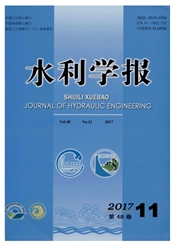

 中文摘要:
中文摘要:
选取半干旱地区老哈河流域为研究对象,基于双源蒸散发能力计算模型和混合产流模块,依据palmer旱度模式的思路,构建适用于我国北方半干旱地区的机理性旱度模式。利用该模式计算15个代表站点1957—2008年的旱度值,并与实际旱情记载以及降水距平百分率进行了对照检验。结果表明,该旱度模式计算的各地区的Palmer干旱指标与文献描述的干湿情况较为一致,能够反映所研究区域干旱程度的变化情况;与降水距平百分率相比,该模式综合考虑了水分亏缺量和持续时间因子对干旱强度的影响,可以反映流域下垫面特性及植被生理物候特性对干旱的影响机制,能够更好地表现干旱过程的持续性。此外,该模式还能合理给出旱情在空间上的发生和发展的变化情况。
 英文摘要:
英文摘要:
According to the fundamentals and method of the Palmer Drought Severity Model, a physical- ly-based drought severity model is established based on the two-source PET model and hybrid runoff mod- ule for assessing and predicting the drought severity which is suitable for semi-arid region in northern Chi- na. The Laohahe watershed in semi-arid region of northern China is selected as study area. The monthly PDSI of 15 meteorological stations in the periods of 1957--2008 are computed and compared with the re- corded drought situation and the percentage of precipitation anomaly. The results show that the computed PDSI values are well agree with the actual drought records. It is found that the proposed drought severity model can consider the drought durative and soil water deficit comprehensively and reflect the effects of veg- etation type, vegetation physiological features and phonological characteristics on drought. It also can be con- eluded that the model can represent the persistence of drought more appropriately. In addition, the spatial variation of drought can be obtained by using the model.
 同期刊论文项目
同期刊论文项目
 同项目期刊论文
同项目期刊论文
 期刊信息
期刊信息
